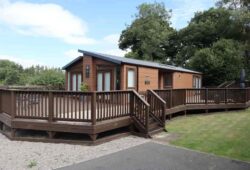I’m sure many of us adventurous souls have dreamt of living outdoors and get the freedom to move around. That’s why hunters and anglers have considered living in an RV, which has shown a lot of promise.
But wait: is it cheaper to live in an RV than a home in the first place?
Well, you do get to ditch mortgage or huge rentals, and you get to head to all the places you want! However, there are some things to consider, which can rack up prices and expenses. So read on to find the comparisons of living in an RV vs a house to see which suits you and your budget best.
Contents
Expenses of Living In an RV vs. a House
You’ll be surprised that the costs differ, depending on where you’re from and living preferences. Here are the comparisons to help you figure out the costs and which is the cheaper option:
1. Rent vs. RV Park Fees
The costs of your house, whether renting or owning, vary widely.
The average cost of living in a house is about $900 a month, even more depending on the state and size of the home. In some areas, it can go higher than $1,000 to $2,000 a month!
As for owning an RV, you first have to consider how much the RV is. Like investing in a house, the prices vary, depending on the type of RV you want.
The price can range between $10,000 to $300,000, with a good RV costing an average of $50,000 or so. A larger RV can cost up to $100,000, which already comes with good features.
So you can do the math and compare your home rent or monthly mortgage vs the cost of an RV.
For a $200,000 home, you’re either paying the mortgage or renting, which can work out to be $1,000 a month. For an RV, a standard one can cost about $400 a month or more, if you choose to get an installment rather than pay upfront.
With this in mind, getting a standard RV over a home may be the cheaper option.
BUT, take note that with an RV, you have to pay for parking in an RV Park. This ensures your safety and gives you a protected area to sleep in.
On average, a month’s rent in an RV Park can cost you between $300 to $1,000, depending on the area you choose to stay in. Expect to shell out $500 to $600 a month for the long-term.
If you want something more permanent, there are RV Parks that allow you to buy deeded lots, similar to the concept of condominiums. This is a great option if you prefer homesteading or if you need an address for mailing purposes.
If you like to go around and experience more freedom, expect to pay $5 to $70 a night, again depending on the area. You can also opt to boondocking so you don’t pay a dime, though this isn’t a suitable long-term living option.
The price for living in an RV remains almost similar to renting a home but which more freedom and a tad more savings of up to $100 to $200 a month.
2. Insurance Costs
There are two insurance types to consider when living in an RV, which is RV insurance and health insurance. When driving an RV, it can cost between $1,000 to $2,000 a year, or around $100 a month on average.
It’s important to remember that your RV serves two purposes: a car and a home. Therefore, you must ensure that your insurance covers all bases. Most companies only offer regular auto insurance, which doesn’t always cover damages to appliances and equipment inside the car.
If your insurance carrier doesn’t have policies specifically designed for RVs, look somewhere else or ask your agent for advice. Avoiding insurance mistakes early on will pay off over time, especially if you plan on living in your RV full-time.
As for house insurance, it can vary, depending on the insurance inclusions, home size, and condition, as well as the state you live in. It’s almost similar to RV insurance, which costs up to $2,000 yearly.
But with homes, there is a property tax and other taxes to consider, making it considerably pricier compared to owning an RV. The average property tax depends on the state, ranging from $1,500 to $5,000!
3. Utility Bills
With RV, you have to consider the fuel costs, which is the biggest expense to consider. To fill up your RV’s fuel tank, it can cost you between $60 to $600. That’s enough to run a few hundred miles. If you’re an American Express credit card holder, you can use your earned points to pay at gas stations. Alternatively, you can trade your bulk points for extra cash.
As for homes, expect to pay about $250 to $400 a month on utilities, which include your water, electricity, basic cable, and Internet, among other miscellaneous bills.
As for RV, beyond fuel, you won’t have to pay too much in utilities. You may have to pay for a phone or Internet plan to stay online, which can cost about $100 or less monthly. Some RV Parks provide Wi-Fi access for an additional fee, but speed and stability aren’t guaranteed since you’ll be sharing it with all your neighbors. If you want to invest in a phone or Internet, go for one that offers unlimited data so you can stay connected wherever you go.
4. Repairs and Maintenance
And of course, there are the repair and maintenance fees of home and RV.
You will need to maintain your RV, though this costs considerably less compared to owning a house and car. A homeowner would usually spend up to 4% of their home value in repairs and maintenance.
This is compared to RV living, which won’t cost as much and have you save up to $150 a month. However, this only applies if you have knowledge of RV maintenance and prevent it from breaking down.
Read More: Can You Live In A Camper On Your Own Land – Key Things You Should Know
Is It Cheaper to Live in an RV Than a Home?
With all that in mind, which is the cheaper option?
When you play it right, you can see that living in an RV can be cheaper. As long as you know where to park, care and maintain for the RV properly, and that you monitor your budget carefully, you can save a lot.
However, you also have to consider the emotional and physical expenses as well. Some may not prefer RV living because of the huge change and slightly limited space. If the thought of a sudden lifestyle change scares you, why not do some practice runs? Try living in an RV for a few weeks or months and see how well you can adjust with minimal amenities.
But if you believe that you love the flexibility and freedom RV living holds, then you can begin searching for the best RVs, insurances, and to financially prepare for the RV life!
Wrapping It Up
When it comes to RV vs home living, sometimes the RV may not be the most feasible option. But when you play your cards right and know how to care for your RV and park it in less expensive areas, you can save more in the long run. It’s all about how you spend and the lifestyle you want.
I hope that this article answers your question, “is it cheaper to live in an RV than a home?” Now that you’ve weighed your expenses, start considering your expenses and prepare ahead if you want to make the huge change!




